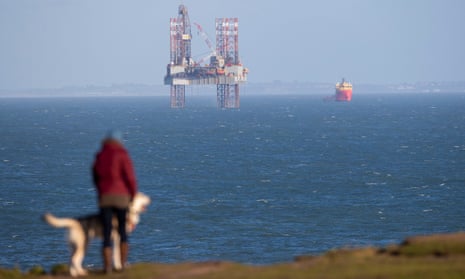An oil company drilling off the Dorset coastline is attempting to extend its licence into the spring, challenging the conditions imposed to protect the sea’s many sensitive wildlife species.
Corallian Energy has set up a rig visible from the protected coastline and in close proximity to 58 marine and coastal protected areas. Sensitive and protected species offshore include bottlenose dolphins, seahorses, rays and breeding populations of seabirds including sandwich terns and little terns.
Despite opposition from environmentalists and local people, the government offshore petroleum regulator (Opred), part of the Department for Business, Energy and Industrial Strategy, gave permission for Corallian to carry out exploratory drilling last year.
But after representations from the Environment Agency and Natural England, among others, the company was restricted to drilling in the winter and not in the spring to mitigate “significant concerns in relation to both landscape and seascape impacts and potential effects on migratory fish”.
Despite the conditions Corallian has gone back to Opred seeking permission to extend the drilling into March.
The rig was approved after an application for a windfarm off the coast was turned down on grounds it would harm the views from designated Areas of Outstanding Natural Beauty and England’s only natural Unesco World Heritage Site, the Jurassic Coast.
If significant oil is confirmed it will be extracted via horizontal long-reach drilling via Wytch farm, at Poole harbour, Europe’s biggest onshore oil facility.
Neil Garrick-Maidment, of the Seahorse Trust, said the waters were home to the UK’s two seahorses, the short-snouted and the spiny, and permission should never have been given for the drilling. The seahorses are protected under schedule 5 of the Wildlife and Countryside Act, one of the strongest wildlife protections under law.
He said protected species had been totally ignored in the evaluation for the well. “The rig should never have been put there in the first place and to now go into the spring is absolutely appalling,” he said. “The potential risk of disaster for these species is huge. Seahorses are migratory, they shelter in winter in the seas exactly where the rig is, and in the summer they move inland. The noise from the rig causes them stress and activates diseases. The sediment from the drilling makes it difficult for them to feed.”
On 20 February campaigners from Save our Shores are holding a public meeting to fight new fossil fuel extraction in the sea.
Sara Pascoe, of Save our Shores Bournemouth, said the rig was the most recent fight against continued extraction from Dorset on and offshore. “We are fighting this rig individually and also we are saying all extraction should be stopped,” she said.
Angela Pooley, of East Dorset Friends of the Earth, said: “We should not be investing in fossil fuel extraction, we should be investing in renewables. Yet the government has given permission for this oil rig when it turned down attempts to build a windfarm on the grounds of the impact on the Jurassic Coast. We are strongly opposed to this drilling. There a risk of spillage and the risk to species, and now they are trying to continue into the spring against the conditions of the original permission.”
The proposed well, four miles north-east of Studland Bay, was first drilled by BP and British Gas in 1986. Further geological explorations in 2017 confirmed the potential for commercial volumes of oil.
Corallian, a private oil and gas exploration company, confirmed it had applied to extend its licence to drill. A spokeswoman said: “A formal request has gone to Opred to extend the permission for drilling to continue beyond the end of February should that be required.”
In granting its original permission to drill there, Opred said: “Many of the environmental concerns relating to the proposals would be best addressed if the operations were undertaken during the winter months. Corallian accepted this advice and scheduled the drilling operations to be undertaken during the period November 2018 to February 2019. This was therefore incorporated into the proposals as a mitigation factor.”
The Corallian spokesperson said an environmental assessment had been submitted for licence approval. The government said the company had submitted an amended environmental assessment to extend the licence.
A spokesperson for the Department for Business, Energy and Industrial Strategy said: “Applications to extend drilling operations into March are currently being reviewed and approval will only be given if there is no significant adverse effect on the environment.”
